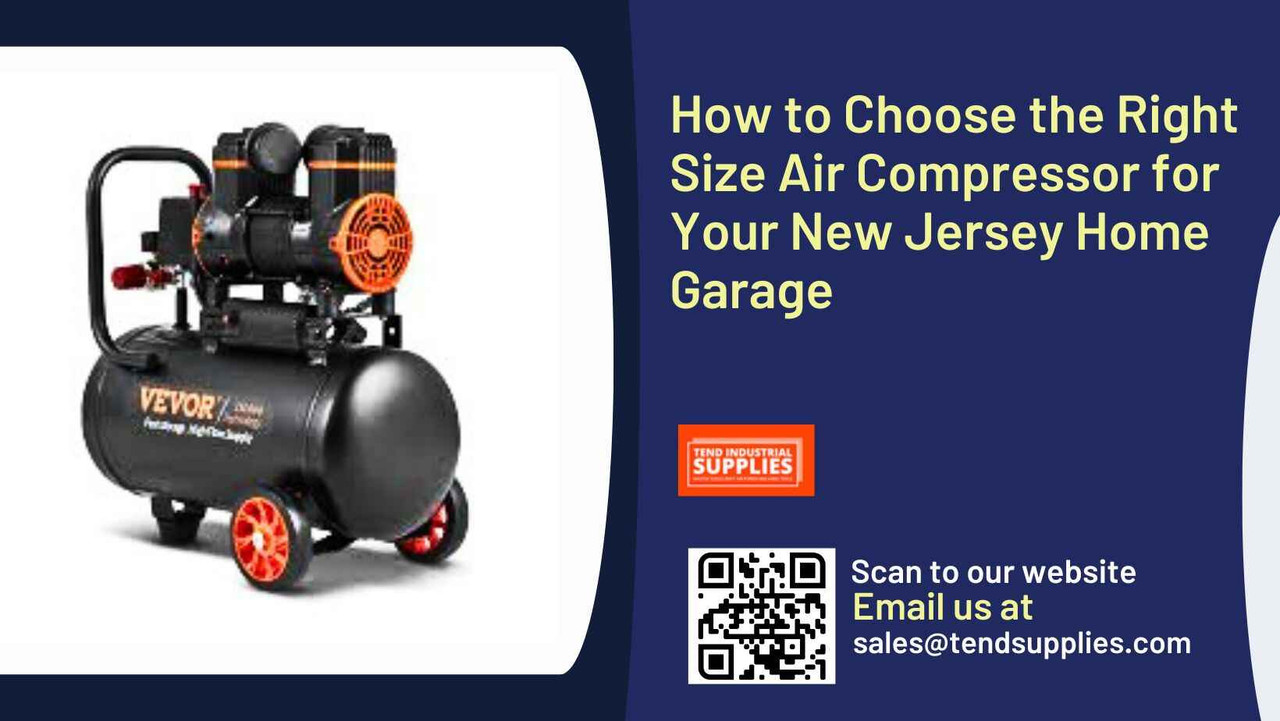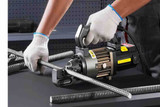How to Choose the Right Size Air Compressor for Your New Jersey Home Garage
Key Takeaways
Introduction
Choosing the right air compressor for your home garage in New Jersey can be a game-changer for DIY enthusiasts and professional mechanics alike. With the right size air compressor, you can power a wide range of tools, from impact wrenches and paint sprayers to air nailers, making your projects more efficient and enjoyable.
One of the key factors in choosing the right size air compressor for your New Jersey home garage is understanding your tool requirements. Different air tools have varying air consumption rates, measured in cubic feet per minute (CFM). For instance, tools like airbrushes and brad nailers require lower CFM, typically between 1 to 3 CFM, while more demanding tools like impact wrenches and sanders may need 4 to 6 CFM or more. When selecting an air compressor, consider the CFM rating of the most demanding tool you plan to use and choose a compressor that can deliver that amount of airflow consistently. It's advisable to select a compressor with a slightly higher CFM rating than your tools require, ensuring it can handle multiple tools or continuous use without losing pressure. This ensures that your air compressor can efficiently power all your tools and projects without interruptions.
This guide will walk you through the key factors to consider, ensuring you choose an air compressor that fits your needs, maximizes your garage’s capabilities, and keeps your projects running smoothly.
Understanding Air Compressor Basics
Before diving in, let's explore key metrics and components:
- CFM (Cubic Feet per Minute): The most crucial factor, CFM measures the air volume the compressor delivers per minute. Tools have minimum CFM requirements for proper operation.
- PSI (Pounds per Square Inch): PSI indicates the air delivery force. While important, most compressors offer sufficient PSI for common garage tools.
- Tank Size (gallons): This determines how much compressed air can be stored. A larger tank allows for longer run times before the compressor needs to cycle on again.
- Motor Size (horsepower): The motor size affects the compressor's ability to refill the tank quickly and maintain pressure during use.
For a deeper explanation, check out our article on Understanding Air Compressor Specifications.
To choose the right size air compressor for your New Jersey home garage, consider these factors:
1. Tools You'll Be Using
Different pneumatic tools have varying air requirements. Common tools include:
- Nail guns (home improvement)
- Impact wrenches (automotive work)
- Spray guns (painting projects)
- Air ratchets (mechanical tasks)
- Tire inflators (vehicle maintenance)
Make a list of your intended tools and note their CFM requirements. Your air compressor should meet the needs of your most demanding tool.
2. Frequency and Duration of Use
Consider how often and for how long you'll be using your air compressor. Weekend DIYers might need a smaller compressor, while serious hobbyists might require a larger, more powerful unit.
3. Available Space
New Jersey homes often have limited garage space. Measure your designated area, keeping extra space in mind for maintenance and airflow.
4. Portability Needs
If you need a portable air compressor for outdoor projects, consider a portable model. However, for stationary use, a stationary compressor might offer more power and capacity.
Types of Air Compressors
Several air compressors suit New Jersey home garages:
1. Reciprocating (Piston) Compressors (Most Common):
Single-stage: Suitable for most DIY tasks and light automotive work.
Two-stage: More efficient for continuous use or higher-demand applications.
2. Rotary Screw Compressors:
While typically used industrially, smaller models are becoming popular for serious home mechanics due to their efficiency and quiet operation.
3. Pancake Compressors:
These compact, portable compressors are ideal for small garages and light-duty tasks like using nail guns or inflating tires.
For more information, read our article on
Sizing Your Air Compressor
Follow these steps to determine the right size air compressor:
- Calculate Total CFM Requirements: Add up the CFM requirements of the tools you'll be using simultaneously. Add a 20-30% safety margin.
- Determine Duty Cycle: This is the percentage of time the compressor can run without overheating. A 50% duty cycle is often sufficient for home use.
- Consider Tank Size: For intermittent use, a larger tank can compensate for a lower CFM rating. In New Jersey's climate, a larger tank can also help manage moisture issues.
- Factor in Altitude: New Jersey's elevation is relatively low, so this won't significantly affect most compressors' performance.
Here's a general sizing guide:
- Light Duty (occasional use, one tool at a time): 2-3 CFM, 2-
- Light Duty (occasional use, one tool at a time): 2-3 CFM, 2-6 gallon tank
- Medium Duty (regular use, one tool at a time): 4-6 CFM, 10-30 gallon tank
- Heavy Duty (frequent use, multiple tools): 10+ CFM, 60+ gallon tank
New Jersey-Specific Considerations
When choosing an air compressor for your New Jersey home garage, keep these local factors in mind:
1. Climate: New Jersey experiences high humidity in summer and cold winters. Look for compressors with:
- Efficient moisture removal systems
- Cold weather start capabilities
- Proper insulation for outdoor or unheated garage use
2. Noise Regulations: Many New Jersey municipalities have noise ordinances. Consider quieter compressor models, especially if you live in a densely populated area.
3. Energy Efficiency: With New Jersey's focus on energy conservation, look for energy-efficient models to reduce your carbon footprint and save on electricity bills.
4. Space Constraints: Given the typically smaller garage sizes in many New Jersey homes, consider vertical tank designs or wall-mounted options to save floor space.
Maintenance Considerations
Proper maintenance is crucial for the longevity and performance of your air compressor, especially in New Jersey's climate:
- Regular Draining: Due to high humidity, drain the tank frequently to prevent rust and moisture buildup.
- Air Filter Cleaning: Clean or replace air filters regularly to maintain efficiency.
- Oil Changes: For oil-lubricated compressors, change the oil as recommended by the manufacturer.
- Belt Tension: Check and adjust belt tension periodically for belt-driven models.
For more maintenance tips, refer to our guide on Air Compressor Maintenance: Essential Tips for Longevity.
Top Air Compressor Brands for New Jersey Home Garages
While there are many reliable brands, some stand out for their performance and durability in conditions similar to New Jersey:
- VEVOR: Offers affordable yet reliable options for DIY enthusiasts.
- California Air Tools: Known for their quiet operation and oil-free designs.
- DeWalt: Offers a range of portable and stationary compressors suitable for various needs.
- Ingersoll Rand: Provides high-quality, durable compressors for more demanding users.
- Makita: Popular for their compact and efficient compressors.
For a more comprehensive comparison, check out our article on 2024's Leading Air Compressors: Comprehensive Reviews and Buyer's Guide.
Frequently asked Questions
1. Can I use an indoor air compressor in my unheated New Jersey garage?
While possible, it's best to choose a compressor rated for colder temperatures or take steps to insulate and protect it during winter months.
2. How often should I drain my air compressor tank in New Jersey's humid climate?
In New Jersey's humid conditions, it's recommended to drain your tank after each use or at least weekly if used frequently.
3. Are oil-free compressors better for home garage use in New Jersey?
Oil-free compressors are generally easier to maintain and better suited for New Jersey's temperature fluctuations, but they may be louder and have a shorter lifespan compared to oil-lubricated models.
4. What size air compressor do I need for spray painting in my New Jersey home garage?
For spray painting, you typically need a compressor that can deliver at least 10-15 CFM at 40 PSI. Consider the specific requirements of your spray gun and the scale of your projects.
5. How can I reduce the noise from my air compressor in my New Jersey home garage?
Consider using sound-dampening mats, building an insulated enclosure, or opting for a quieter model like those offered by California Air Tools.
Conclusion
Choosing the right size air compressor for your New Jersey home garage involves careful consideration of your specific needs, available space, and local conditions. By understanding the key metrics like CFM and tank size, and taking into account New Jersey's climate and regulations, you can select a compressor that will serve you well for years to come.
Remember, the best air compressor for your garage is one that meets your current needs while allowing for some future growth. Whether you're a weekend DIY enthusiast or a serious hobbyist, the right air compressor can significantly enhance your productivity and the range of projects you can tackle in your New Jersey home garage.
Ready to find the perfect air compressor for your New Jersey home garage? Visit tendsupplies.com or contact us at sales@tendsupplies.com to explore our wide range of air compressors and receive expert advice tailored to your specific needs. Let us help you power up your projects with the right air compressor for your New Jersey home!
Related Articles
I hope this comprehensive guide helps you make an informed decision when choosing an air compressor for your New Jersey home garage!









